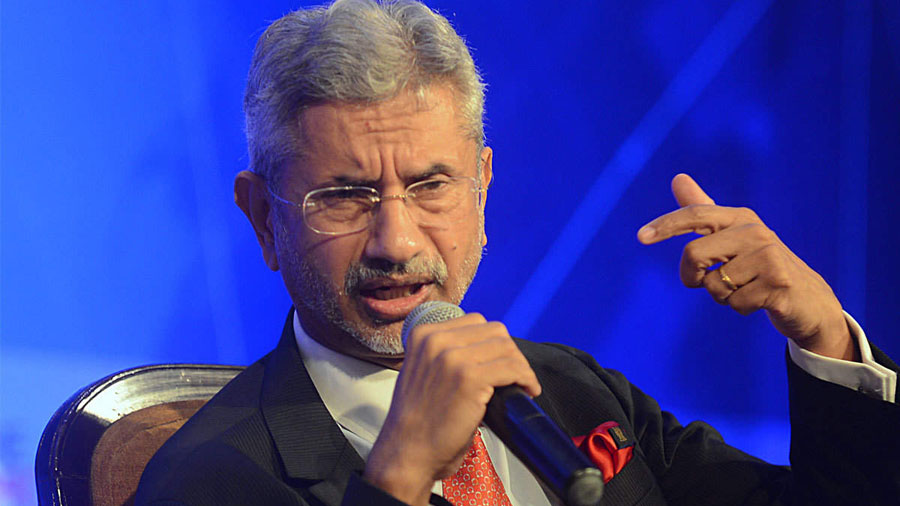The UNSC members endorsed in one voice a "zero tolerance" approach to terrorism in all its forms and manifestations, External Affairs Minister S Jaishankar said on Thursday as the top UN body issued a strong statement under India's Presidency, underscoring the need to ensure a strict check on terror financing and bring perpetrators of terror attacks to justice.
The powerful 15-nation Council, currently being presided over by India, issued a Press Statement on ISIL/Da'esh after Jaishankar chaired the Security Council briefing on 'Threats to international peace and security caused by terrorist acts'.
The UNSC briefing considered the 13th report of the Secretary General on the threat posed by ISIL (Da'esh) to international peace and security.
Speaking to reporters after the briefing, Jaishankar said, "During our deliberations today, all Security Council members with one voice endorsed a zero-tolerance approach to terrorism in all its forms and manifestations. We are clear that there cannot be double standards and distinctions are really made at our own peril.
"We are happy to note that a very strong, substantive, clear Press Statement has been adopted by the Council today that outlines many of the key concerns, especially the need to ensure a strict check on terror financing and bringing the perpetrators of the terror attacks to justice," he said.
The Press Statement, issued by Jaishankar in his capacity as the Council President, said members of the Security Council noted with deep concern that ISIL (Da'esh) and other terrorist groups continue to exploit, both online and offline, of the disruption, grievances and development setbacks linked to the COVID-19 pandemic, as reflected in the 13th report of the Secretary General on ISIL.
The members of the Security Council reiterated that they condemn in the strongest terms all instances of terrorism, including the recent cowardly terrorist attacks, such as, the terrorist attack in Baghdad on July 19, 2021, and noted with concern that ISIL (Da'esh) could regain the ability to launch or orchestrate international terrorist attacks, the press statement said.
The Council members, on the eve of the fourth commemoration of the International Day of Remembrance of and Tribute to the Victims of Terrorism on August 21, 2021, reiterated their unwavering commitment to strengthening international cooperation to prevent and combat terrorism in all its forms and manifestations.
They also reaffirmed that terrorism in all its forms and manifestations constitutes one of the most serious threats to international peace and security, and that all acts of terrorism are criminal and unjustifiable, regardless of their motivation, wherever, whenever and by whomsoever committed, the statement said.
The UNSC briefing was the third signature event held under India's Presidency that has focussed on issues of maritime security and peacekeeping.
Counter-terrorism was the third key focus area for India during its August Presidency of the Council and as a country which has borne the brunt of cross-border terrorism, this will be a priority issue for India during its remaining term in the Security Council as well.
India will be Chairing the UNSC Counter Terror Committee (CTC), in 2022, taking over from Tunisia and Jaishankar said New Delhi hopes to build on the gains from Thursday's meeting during its chairmanship of the CTC.
At the briefing, UNSC member states joined India's call for a zero-tolerance approach towards terrorism in all its forms and manifestation.
In a serious cause of concern, various terror organisations like ISIL, al-Qaeda, Lashkar-e-Taiba, Jaish-e-Mohammad, Haqqani Network and their frontal organisations are growing in strength and gaining new grounds with impunity, encouragement and state sponsored hospitality.
The Council members expressed concerns over the increasing use by ISIL and its financiers of Information and Communication Technologies (ICT), including emerging technologies, such as virtual assets and other anonymous means of monetary or financial transactions.
They also underscored the importance of international cooperation, effective governance in line with international law, and innovative partnerships with the private sector and civil society to prevent and counter the use of ICT for terrorist purposes.
The UNSC Press Statement urged all member states to fulfil their obligations as set forth in relevant Council resolutions to criminalise the financing of terrorism, as well as to build further the capacity of their financial oversight and regulatory systems in order to deny ISIL (Da'esh) and its financiers the space to exploit and raise funds.
This, the statement said, the member states should do so by including by cooperating with the private sector through public-private partnerships with financial institutions and designated non-financial businesses and professions, and by taking into account the assessments thereof by relevant entities such as the Counter-Terrorism Committee Executive Directorate.
The Security Council underscores the importance of a holistic approach to counter terrorism and violent extremism conducive to terrorism, conducted in accordance with applicable international law, as well as efforts to address the governance, security, human rights, humanitarian, development and socioeconomic dimensions of the challenge, including employment for the youth and the eradication of poverty, the statement said.
The members of the Security Council further reaffirmed that member states must ensure that all measures, undertaken to counter the financing of terrorism, comply with their obligations under international law, including international humanitarian law, international human rights law and international refugee law.
The members of the Security Council expressed concern over the alarming expansion of ISIL (Da'esh) in many regions, including in Africa and acknowledged that the growing influence of ISIL (Da'esh) in Africa may have far-reaching implications for the peace, security and stability of the region.
They recalled the Council's Presidential Statement issued in March last year that underscored the need for a coherent and effective regional approach and stressed the importance of an urgent global response to support African countries and regional organisations.
The Council also deplored the continuous attacks on civilians, towns and military camps by ISIL's regional affiliates such as IS in West Africa Province (ISWAP), IS in Greater Sahara (ISGS) and ISIL in Central Africa, and expressed concern over the presence of, and threat from ISIL-Khorasan.











